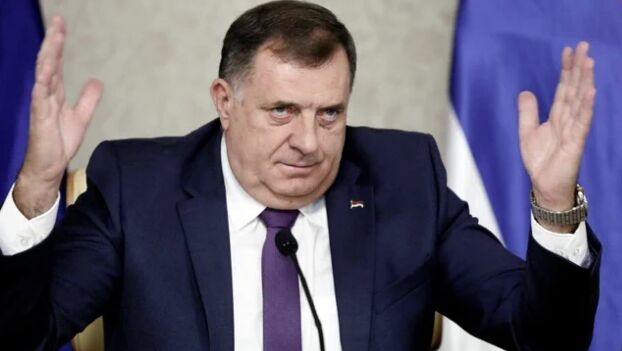Bosnian Serb Leader Orders Arrest and Deportation of International Official, Escalating Tensions in War-Torn Balkans
Tension in Bosnia-Herzegovina escalates as the Bosnian Serb leader orders the arrest and deportation of an international official overseeing peace, sparking protests and ethnic tensions.
Tension Escalates in Bosnia as Bosnian Serb Leader Instructs Police to Arrest and Deport International Official The separatist Bosnian Serb leader, Milorad Dodik, has issued a warning that police have been instructed to arrest and deport an international official overseeing peace in Bosnia-Herzegovina, if he enters the Serb-controlled regions of the war-torn Balkan state. Dodik's announcement further escalates tensions in Bosnia, a country that still bears the scars of a brutal war in the 1990s, which claimed the lives of over 100,000 people and displaced millions.
At the center of the dispute is German government ex-Minister Christian Schmidt, who serves as Bosnia's international High Representative. The Bosnian Serbs, however, refuse to recognize his authority, claiming that he was not legally installed for the top peacekeeping job and was not endorsed by the U.N. Security Council. Dodik, who presides over the Republika Srpska (Serb Republic) in Bosnia, has long advocated for the secession of the region. The country is divided into two entities, with the Bosniak-Croat federation comprising the other half, formed under a U.S.-mediated peace deal that ended the 1992-1995 war.
Dodik has warned that if Schmidt attempts to implement certain decisions in the Serb-controlled areas, they will immediately declare independence from the rest of Bosnia. He has also been sanctioned by the U.S. and the U.K. for breaching the U.S. peace deal that ended the war. In response to Dodik's threats, Bosnian prosecutors are filing charges against him for his separatist actions and for defying decisions made by the High Representative. If convicted by a Bosnian court, Dodik could face up to five years in prison. These developments have spurred Dodik's supporters to organize protests across Bosnia, waving flags featuring Russian President Vladimir Putin and heightening ethnic tensions.
The role of the international envoy was established in the Dayton peace accords, which brought an end to Bosnia's devastating war. The envoy is responsible for overseeing peace in the country, ensuring the autonomy of the two regions, and has the power to impose legislation and remove officials obstructing peace. The international community has reacted to Dodik's actions by halting funding for projects in the Serb Republic, led by the European Union and Germany. Nonetheless, Dodik has expressed his intention to seek investment from other countries, such as China. Amidst concerns of Russia's interference in the region through its ally Serbia, the situation in the Balkans remains tense. Many fear that heightened tensions could divert attention from the ongoing conflict in Ukraine. Concrete actions must be taken to de-escalate the situation and maintain peace and stability in Bosnia-Herzegovina.




